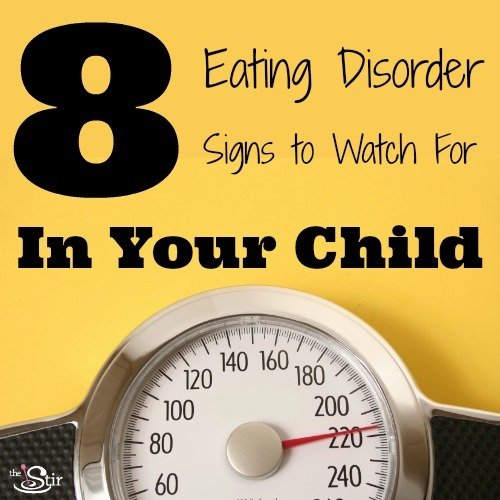We can point the finger at PhotoShop or even the time-honored "fall gal" Barbie, but no matter who's to blame, there's no denying an epidemic is affecting our teens. Approximately a half million teens struggle with eating disorders or disordered eating, according to research published in the Archives of General Psychiatry. One out of every 100 women between the ages of 10-20 is suffering from anorexia nervosa, defined as refusal to eat adequate calories out of an intense and irrational fear of weight gain. Meanwhile, 4 out of every 100 college-aged women have bulimia, a disorder that involves binge eating and then vomiting or using laxatives to prevent putting on pounds. That said, it's no wonder moms find themselves fearing that their teen may too battle an eating disorder.
Thankfully, there are some red flags experts say parents can look out for. Here, 8 telltale signs your teen may have an eating disorder, and what you can do if you suspect that's the case.

- She takes a sudden, intense interest in food, calorie-counting, and weight. "One of the first signs of an issue is a sudden and intense interest in food, calories and weight," explains eating disorder specialist Sarah J. Blake, LCSW with Blake Psychotherapy & Associates in Maryland. "This may be coupled with a change in what a teen is 'allowing themselves' to eat. You also may notice that they begin cooking and baking more, but do not allow themselves to partake in what they make. In the beginning, this behavior might look like the teen has gone on a diet, but unfortunately, diets can quickly turn from something that the teen had control over to something that controls them." In fact, research shows that 35 percent of “normal dieters” progress to pathological dieting, and of those, up to 25 percent progress to an eating disorder. For that reason, it's important for parents to keep close tabs on their teen's health-conscious behaviors and disordered eating behaviors just as much as behaviors that point more clearly to an eating disorder, says Blake.
- She has a sudden, fervent passion for fitness. It's one thing if your teen is psyched to go out for track or the swim team or just get more physical activity for her health, but if her workouts seem excessive, it's quite possible she has an eating disorder. "Often, indicators that exercise is not healthy include exercising compulsively, when sick or injured, and even after they have been told to stop by a medical doctor," explains Blake.
- She drops a noticeable amount of weight quickly. In adolescents, this means a rapid and/or significant loss of weight within a relatively short period of time, notes psychologist Meghan Feehan, PsyD. at the Eating Disorders Program at Goryeb Children's Hospital in New Jersey. "However, anorexia is often missed when an individual starts at a higher weight — or is overweight — and loses a significant amount of weight, but will still appear or will be classified to be in a healthy weight range," she notes.
- She starts having other abnormal physical symptoms. "Other medical factors to look out for are the loss of a period, frequent complaining of being cold and/or dizzy, thinning hair, and lanugo (increase of hair on the arms)," notes Feehan. A teen battling bulimia may have swollen cheeks, or "chipmunk cheeks," which is the result of the parotid glands in the face working to compensate for the loss of fluid elsewhere in the body, as well as an increase in cavities, a visual wearing of the enamel of the teeth, complaints of stomach pain, stomach flu, and bloodshot eyes (due to the pressure of self-induced vomiting), explains Blake.
- She seems to have certain "food rituals" or habits she practices regularly. These might include taking tiny bites or re-arranging food on the plate. "A common reaction I hear from parents upon diagnosis of an eating disorder is, 'But my child eats,'" explains Feehan. "Although anorexics may skip meals entirely, it is much more common that the quantity at meals decreases and/or the variety of foods eaten is limited."
- She adopts a highly-restrictive diet of the blue. "Your son or daughter decides to become a vegetarian, then a vegan, then a raw food vegan, then gluten free; basically, establishing food rules without justification—not even so much as a concern after a visit to the local farm where they felt bad for the chickens," explains clinical nutritionist Lori Lieberman, RD, Lori Lieberman & Associates in Massachusetts. "Or they’ve reduced their food choices to a limited number of items, which may include items like yogurt, almond milk, fruits and vegetables."
- She gets anti-social. "One of the classic behaviors is withdrawal from social activities, so they do not need to eat," notes Blake. "You may hear from someone at school that your teen is not eating lunch, that there have been witnesses saying that they saw her throw out her lunch, and when she comes back from an outing with friends or at school, she will tell you that she already ate and/or will be eating with friends later. However, that eating does not take place." Another sign that goes hand-in-hand with this: "They may exhibit changes in mood, becoming anxious, depressed, or angry before, during, or after meal times," notes Corrine Kopp, LSW, The Renfrew Center of Philadelphia, Pennsylvania.
- What she sees in the mirror isn't in tune with reality. Everyone suffers from poor body image from time to time, especially in adolescence, but if you're child is especially negative about his or her appearance, it may point to an eating disorder. "Teens with an eating disorder often have negative opinions about their body and their self-esteem is influenced by their weight," says Kopp.
The bottom-line: "If the way in which an individual acts around food interferes with the way they live life in any appreciable way, help is needed," Blake says. "On average, it takes 5-7 years to treat an eating disorder. It is also key for a parent to be involved in bringing their child back to health. As parents, we have the best understanding of our children. If you suspect a problem, most of the time, there is a problem. Knowing to trust your instincts about your child is another important part in helping your child to get the help they need."
For further information and resources, check out the National Eating Disorders Association (NEDA)'s site, MaudsleyParents.org, and Feast-Ed.org.
Images via iStock/Tammy616; © iStock.com/Kameleon007




